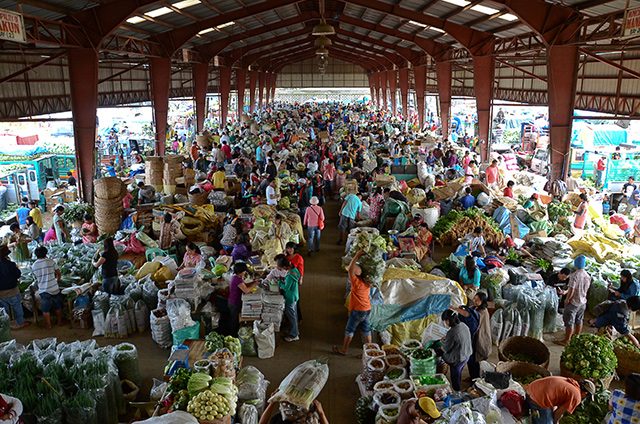SUMMARY
This is AI generated summarization, which may have errors. For context, always refer to the full article.

BENGUET, Philippines – The vegetable-producing province of Benguet north of Manila started experiencing intermittent rains this week after a long dry spell, but the drought has already taken its toll on the farms.
“Drought started since January and the rains we felt are actually late,” provincial agriculturist Lolita Bentres said on Tuesday, April 21.
She said that in past years the planting season for most farmers was usually signaled by the rains during Holy Week around late March. This year, however, the came only this week, the latter part of April.
This delayed the planting of crops in many parts of Benguet, especially in more elevated areas far from the Agno River and its tributaries.
Bentres said her office has received reports that several areas in the town of Sablan were unable to plant upland rice due to the dry spells that greatly reduced irrigation.
“In kada (mountainous areas), they have to wait for the rain, but not all farmers share the same gasat (luck),” farmer Noel Damoslog of Buguias town said Friday morning, April 24.
He is among the fortunate farmers since his farm in sitio Magmagaling, Loo Valley is irrigated by nearby Agno River. He said fellow farmers who source irrigation from mountain springs felt the dwindling of water source.
“Before there could be two drums in a day, now there is only one,” Damoslog said.
Buguias, his town, is among the top producers of potatoes, cabbages, and carrots. Benguet is the country’s top producer of temperate vegetables, serving around 80% of market demand nationwide.
On April 18, the Philippine Atmospheric, Geophysical, and Astronomical Services Administration (PAGASA) warned that dry spells could intensify in the coming weeks and would peak in May.
Benguet is among the 30 provinces the state weather bureau earlier announced to experience dry spell or low rainfall. Other Abra, Ifugao, Kalinga, and Apayao – also in the Cordilleras – are threatened as well.
Dry spell is being experienced as well in the provinces of Ilocos Norte, Ilocos Sur, La Union, Batanes, Pampanga, Tarlac, Zambales, Palawan, Negros Occidental, Negros Oriental, Bohol, Zamboanga del Norte, Zamboanga del Sur, Zamboanga Sibugay, Camiguin, Lanao del Norte, Misamis Occidental, Misamis Oriental, South Cotabato, Sarangani, Agusan del Norte, Surigao del Norte, Basilan, Lanao del Sur, and and Sulu.
Resilient
Bentres, however, said the effects of the drought are still manageable and were lessened by the intermittent rains. She said Benguet farmers have learned to cope with such situations.
“They will always find a way because it is their only source of livelihood,” the agriculturist explained.
The provincial government and other government agencies, such as the National Irrigation Administration, have distributed small farm reservoirs or catchment basins in several drought-hit areas.
For areas not covered by that initiative, Bentres said farmers have improvised by digging large holes and lining them with large plastic sheets or used tarpaulins to act as catchment basins.
She said farm-to-market roads have enabled the faster delivery of water to the farms.
Bentres said water deliveries have kept the cut-flower industry stable, especially in the capital town La Trinidad, where over 85% of cut-flowers are cultivated.
In La Trinidad, water delivery amounts to P25 to P30 per drum; in Buguias, price ranges from P30 to P50, depending on how far the location is.
Romeo Saltin, another farmer from Sinipsip, Buguias, said dry spells are the least of their worries. The pests and low prices of vegetables brought on by the ASEAN Free Trade Agreement were their bigger concerns.
On Friday morning, he said, he sold his potatoes for P14 a kilo, a huge drop from the P21 per kilo price a day earlier.
“When vegetable importation was not legal and it was at its highest, it was tough for us, but we can only do so much as simple farmers. Now they say it is totally legal, I guess we have to find ways to endure and survive,” Saltin said. – Rappler.com
Add a comment
How does this make you feel?
There are no comments yet. Add your comment to start the conversation.